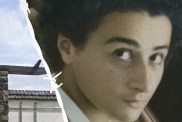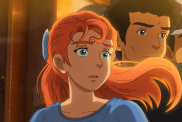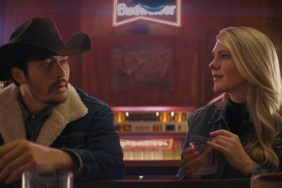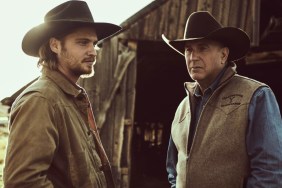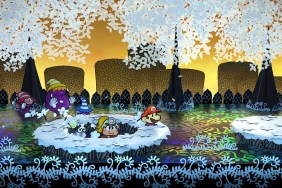Hitting VOD on June 8

John Carpenter has gotten older, but his attitude is still the same. Cynical. Mercenary. Wielding dry-as-the-desert wit. Perhaps the only thing that’s changed is his cigarette of choice. Inside a hotel room off of La Cienega, Carpenter is sitting before a small group of press with Amber Heard, the leading lady of his latest feature film The Ward. He casually slips a cigarette out of his pocket, but this is an electronic cigarette. It appears Mr. Carpenter has become more health conscious with his age.
The Ward, his first film since 2001’s Ghosts of Mars, is hitting VOD on June 8 before entering a limited theatrical run a month later. The film sees Carpenter exploring supernatural territory as a young woman (Heard) tries to unlock the secrets of the psychiatric facility she has been committed to.
Today, Carpenter opens up to talk about his absence from the feature film scene and his near retirement while Heard talks about working with a master of horror while speaking frankly about her experience on the unreleased All the Boys Love Mandy Lane.
Shock Till You Drop: Creatively, what clicked with you about The Ward?
John Carpenter: I hadnât made a movie since 2001 and, frankly, I had to stop. I got burned out on the movie business. I didn’t want to do any more, I thought about quitting. It was Amber Heard who brought me back from the dead, but this movie in particular was perfect. I started on the road back when I did two episodes for “Masters of Horror,” and it was fun again. I didn’t have much responsibility. It was an hour of footage, so it wasn’t a giant shoot. The Ward came along and it was perfect, an ensemble cast with a limited location. There was a claustrophobic feel to it. I thought it was a good feel for my first time back directing a feature.
Shock: Was there something specific about the Ghosts of Mars experience that burned you out, or was it just Hollywood in general?
Carpenter: The movie business, dude. I’ve been doing this for 40 plus years and I’ve been doing it back to back to back to back. Not only sometimes writing and directing, but also doing the music. What you give up is your private life. You have none. I just though I couldn’t do it anymore. It also didn’t help that Ghosts of Mars tanked like the Titanic.
Question: What were the tools of trade you stuck with this time? Was there any new equipment or techniques you tried out?
Carpenter: We didn’t have enough money for new equipment or techniques. We barely had money for make-up and hair. We had a lot of struggles on this film.
Amber Heard: [laughs] A lot of women.

Carpenter: Beautiful and talented actresses. And there’s nothing better than being in an asylum with a bunch of beautiful Hollywood actresses. It’s awesome. [laughs] It’s all about storytelling. It’s not about equipment. Nothing else but telling the story.
Question: Performance-wise, was there anything you harkened back to horror-wise? Any specific film?
Heard: Personally, there were not other pieces of movies I wanted to bring with me. I try to find the character and relate to her and forget about all the other stuff. Just find the truth in the character. I went to set and just tried to tell our story and had fun doing it. I luckily got to work with John who is the best at what he does.
Question: What makes him the best in your view?
Heard: He’s a living legend and when I heard he was interested in making this one, I sat down with him and couldn’t believe I was going to work with him. I’m a horror and genre fan. I like making these movies and I was actually thinking of taking a break from making genre films until I sat down with John. There was the end of that break.
Shock: Did you instantly notice a difference working with a vet like John versus contemporary directors like Patrick Lussier and Jonathan Levine?
Heard: I did. Patrick was a technical director. It was about the process, the machines, the explosions and the special effects. With All the Boys Love Mandy Lane [Levine], I felt like I wasn’t working on the same project together. It worked for that movie, I mean that with respect. He did a beautiful job with that film. But none of them are like John Carpenter. You’re really in it with John. You can’t help but be sucked into his madness, but you feel like you’re making a character you believe in. I felt equally as protected and free.
Carpenter: Amber, let me ask you something. On Mandy Lane, did you feel you and the director were making different movies?
Heard: Yeah, we just worked in parallel lines. I worked at making the character I envisioned and he didn’t give me any direction, didn’t give me any idea of what he wanted from me. He just let me do what I was going to do and I, similarly, didn’t try to cross lines with him and it worked.
Shock: You can’t tell that on the screen.
Heard: We had almost no real communication during the process which definitely worked for that setting. It was also his first featureâ¦
Carpenter: He’s scared of you. Actors are scary people.
Heard: [laughs] I’ve been called worse.

Shock: John, are you still scared when you work with new actors and you’re outside of your comfort zone?
Carpenter: Everybody gets scared when you make a movie. They’re lying to you if they tell you otherwise. They’re lying. They’re scared of the project, they’re scared of failing and you just have to get over it. I’m not scared of actors anymore. I’m over it. I think it’s tough when you’re a first-time director, it’s really tough to know what to say. The answer’s simple, but you don’t think that at the beginning.
Question: How quickly into The Ward did you find your groove?
Carpenter: About ten minutes after we started. You get into a routine. You get the day going. Once you get that first rehearsal, everything’s going to be fine. You light it, I can get a cup of coffee, it’s going to be all good.
Question: What are your thoughts on what the genre has become? Because I see this film as a throwback to more classic horror storytelling, but there’s a balance of quiet moments with grisly scenesâ¦
Carpenter: We have some grisly stuff. This young lady right here actually objected to some of the grisly scenes.
Heard: Because I agree, there’s something valuable about the suspense of classic horror that doesn’t just crutch on blood and an almost pornographic view of fear.
Carpenter: I would agree. A movie like Saw or Hostel are about a different kind of story. Their punch and power as a movie is, “Oh my God, I can’t believe what I’m seeing.” The Ward is entirely different. It’s a character study. There’s not much room to go in [the violent] direction.
Question: What were some of the scenes you were apprehensive about?
Heard: I think the movie you see now is free of anythingâ¦.I don’t think there’s anything I objected against.
Carpenter: You though the eye scene went too far.
Heard: That’s right.
Carpenter: Display of the knife in front of her, the relish. You thought I went a bit too far with that.

I had a good time. I enjoyed it. Sure, if I get the right story, the right budget. If you have an ambitious story you need money. When you do something low budget, you have to have realistic expectations of what you’re going to get back. Right now there is a big vogue in Hollywood and it’s the Blair Witch vogue. Let’s make a movie for nothing and we’ll market it and make a bunch of money. I’m not interested in that, that’s a little too rough.
Question: One day, do you want to do an epic western?
Carpenter: [Howard] Hawks directed a western at 70 years old so it’s possible. I’m working on a little gothic western, but I don’t know if they’re going to make epic westerns anymore. Those days are gone, dude, long gone.
Shock: Are you considering getting back to writing something for yourself as opposed to scouring town for stories?
Carpenter: That’s real work. Sitting down and writing. That’s real hard work, not sure if I’m ready for that.
Question: Any plans to get something together with Kurt Russell again?
Carpenter: He’s so expensive. [laughs]
Shock: I see the studio is now saying they’re going back to the source material for They Live. A change of tune from saying they’re just going to remake your filmâ¦
Carpenter: They are paying. You see, there are two kinds of remakes with my films. There are the good kind and there’s the bad kind. They just did a prequel to The Thing. That’s the bad kind because I don’t have any rights in it, so they don’t pay me. If they do Escape from New York or They Live, any movies that I wrote or have a primal position in, I get a check. This is something I’ve wanted to do and find all of my life, to make money doing nothing.
John Carpenter, everyone. For images and videos from The Ward, click here.
Source: Ryan Turek, Managing Editor


